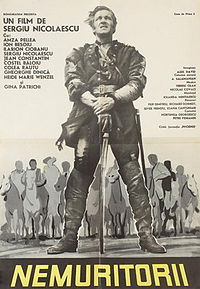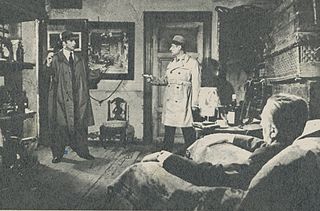Related Research Articles

Sergiu Florin Nicolaescu was a Romanian film director, actor and politician.

Gheorghe Dinică was a Romanian actor.
Oglinda, also known as Începutul adevărului, is a controversial 1993 film by Romanian director Sergiu Nicolaescu. It depicts Romania during World War II, focusing on the Royal Coup of 23 August 1944 that toppled Ion Antonescu, the Axis-allied Conducător and authoritarian Prime Minister.
The Last Ball in November is a 1989 Romanian film directed by Romanian director Dan Pița and based on a novel by Mihail Sadoveanu titled Locul unde nu s-a întâmplat nimic.
![<i>Michael the Brave</i> (film) 1971 [[Cinema of Romania|Romania]] film](https://upload.wikimedia.org/wikipedia/en/2/20/Mihai_Viteazul1970.jpg)
Michael the Brave is a Romanian historic epic film, directed by Sergiu Nicolaescu and starring Amza Pellea in the leading role. The film is a representation of the life of Wallachia's ruler Michael the Brave, and his will to unite the three Romanian principalities into one country. The film was released in 1970 in Romania, and worldwide by Columbia Pictures as The Last Crusade.

Ilarion Ciobanu was a Romanian actor. He has been described as "a legend" in the press and the last true Romanian comic.

Margareta-Yvonne Barbu also known as Marga Barbu born Margareta-Yvonne Butuc was a Romanian actress.
The Actress, the Dollars and the Transylvanians is a 1979 Romanian film directed by Mircea Veroiu and scripted by Titus Popovici. It is the second in a Red Western trilogy that also comprises The Prophet, the Gold and the Transylvanians and The Oil, the Baby and the Transylvanians. American characters speak in English and the Romanian ones in Romanian.

Nemuritorii is a 1974 Romanian historical-adventure drama film. This film was directed by Romanian director Sergiu Nicolaescu. It was released on 22 January 1974 in Romania.

Mircea is a 1989 film about Mircea the Elder, the Christian king of Wallachia who repelled the attempts at conquest made by the Ottoman Empire in the late 14th century and early 15th century. The film also depicts a young Vlad the Impaler, Mircea's grandson, who would succeed him on the throne and continue his legacy of resistance against the Ottoman invasion.
Carol I, also known as Charles I: A Destiny and Charles I: A Destiny for Romania, is a 2009 historical documentary film by Romanian director Sergiu Nicolaescu, starring Sergiu Nicolaescu, Razvan Vasilescu and Cristian Motiu.
The Last of the Mohicans is a 1968 internationally co-produced Western film, co-directed by Jean Dréville, Pierre Gaspard-Huit and Sergiu Nicolaescu. It was the second episode of the European TV miniseries Leatherstocking Tales.

Cu mâinile curate is a 1972 Romanian crime thriller film directed by and starring Sergiu Nicolaescu.
Ultimul cartuș is a 1973 Romanian crime film directed by Sergiu Nicolaescu. It is about commissioner Roman, portrayed by Ilarion Ciobanu, who is trying to avenge his partner's death.

Titus Viorel Popovici was a Romanian screenwriter and author.
Mercenaries' Trap is a 1981 Romanian adventure drama war film, directed by Sergiu Nicolaescu. The movie is set in Transylvania towards the end of World War I.
Mihail, câine de circ is a 1979 Romanian adventure film directed by Sergiu Nicolaescu. It is based on the novel Michael, Brother of Jerry by Jack London.
Thirst is a 1961 Romanian drama film directed by Mircea Drăgan and Mihai Iacob. It was entered into the 2nd Moscow International Film Festival where it won the Silver Prize.

Themistocles Popa was a Romanian composer, musician, and film actor.
Fory Etterle was a Romanian film actor.
References
- 1 2 3 4 Mihnea Columbeanu (November 2, 2011). "Ilarion Ciobanu - Bace hâtru, erou de acţiune" [Ilarion Ciobanu]. Cinemagia. Retrieved November 13, 2011.(in Romanian)
- ↑ "Cu mâinile curate" [With Clean Hands]. Cinemagia. Retrieved November 13, 2011.(in Romanian)
- ↑ "Ultimul cartuş" [The Last Bullet]. Cinemagia. Retrieved November 13, 2011.(in Romanian)
- ↑ "Conspiraţia" [Conspiracy]. Cinemagia. Retrieved November 13, 2011.(in Romanian)
- ↑ "Departe de Tipperary" [Long Way to Tipperary]. Cinemagia. Retrieved November 13, 2011.(in Romanian)
- ↑ "Capcana" [Trap]. Cinemagia. Retrieved November 13, 2011.(in Romanian)